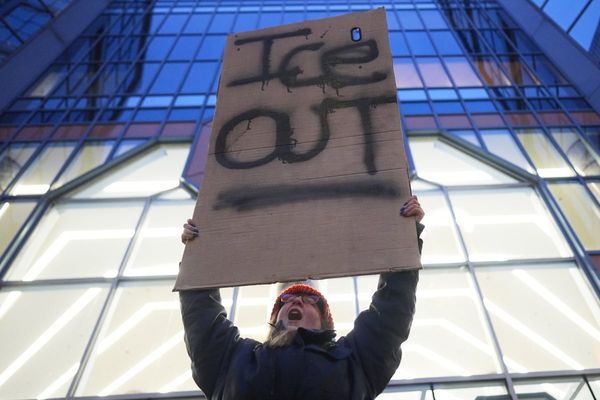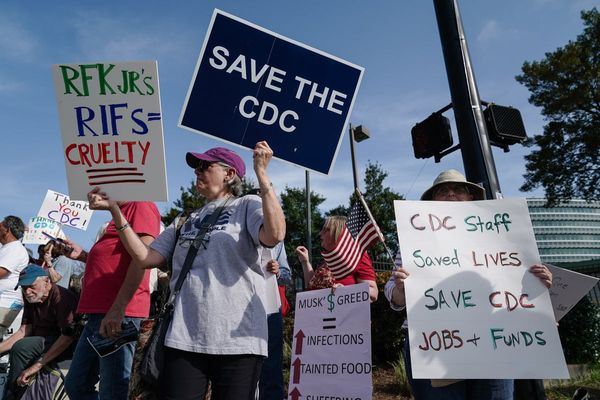
Good morning.
Sudan has found itself in the midst of another crisis, as fighting erupted in the capital, Khartoum, over the weekend between rival military groups after months of growing disquiet over the future of the country and its democracy.
It has only been four years since the country’s dictator, President Omar al-Bashir, was ousted after three decades of vicious rule and euphoria filled the streets as people demanded democratic rule. Things have not quite gone to plan – two of the country’s most powerful generals, General Abdel Fattah al-Burhan, and Lieutenant General Mohamed Hamdan Dagalo (more commonly known as Hemedti or “little Mohammed”), came together in 2021 to take power in a military coup. It was an alliance that has proved short lived as al-Burhan, the head of the army, and Hemedti, the leader of the paramilitary group Rapid Support Forces (RSF), have now turned on each other, with the people of Sudan stuck in the middle.
In today’s newsletter, I take a look at the events that have led up to this moment and what it might mean for people living in Sudan.
Five big stories
Health | MPs in the women and equalities committee have accused ministers of failing to tackle “appalling” and “glaring” racial disparities in maternal health despite repeated promises. They have called for new targets to eliminate inequalities.
UK news | A serving police sergeant in Plymouth faces three rape charges for allegedly raping a woman while he was on duty more than a decade ago. The alleged offences took place in 2009 and were reported to the police in 2020.
France | Air France and Airbus have been cleared of involuntary manslaughter over a 2009 crash that killed 228 people. The court ruled “no certain causal link” with the accident could be shown.
Ukraine | Slovakia has joined Poland and Hungary in their decision to stop imports of grain and other food products from Ukraine to protect local farmers. The European Commission and Kyiv have criticised these bans and have asked the country’s involved to offer an explanation for their decision, following reports that Bulgaria is considering following suit.
Economy | The price of basic staple foods like cheddar cheese, white bread and pork sausages has increased by up to 80% in some shops over the past year, in further evidence that inflation could be hitting poorer households hardest.
In depth: How Sudan got here – and what happens now

Signs that trouble was brewing became clear last week, when the RSF led by Hemedti (above) started stationing forces around the northern town of Merowe – a strategic location with an airport and an electric dam on the Nile – and in other major cities, despite objections from the military’s leadership.
The moves from the paramilitary group culminated in a violent confrontation on Saturday that is still ongoing. Both sides have traded blame over who started the fighting. Residents in Khartoum were caught off guard, as heavy gunfire, airstrikes, and artillery explosions shook the city. So far 185 people have reportedly been killed, including three people working for the UN World Food Programme, and more than 1,800 have been left injured.
The violence has not been limited to the capital, with reports of conflict in cities and towns across the country, including in the war-torn Darfur region and on the borders with Ethiopia and Eritrea – countries that are experiencing their own domestic turmoil.
***
How did Sudan get here?
In December, after months of negotiation, Sudan’s military and civilian leaders signed a preliminary deal to end the military rule that has governed the country since October 2021. The point of the agreement was to begin the process of moving towards civilian-led democratic rule. It was a significant moment, however a number of important and complicated issues were left unresolved, including the crisis in Eastern Sudan and questions around reforming the military and security sector.
Over the last four months, these issues left the RSF and the military at an impasse. The mounting tension between the rival leaders made coming to a resolution in these negotiations near impossible and earlier this month they were paused. Central to this hostility was the question of how the RSF should become integrated into the military – the army had said it should happen in two years and the RSF shot back with a far longer timeline: ten years. Hemedti then accused al-Burhan of refusing to relinquish control, further straining their deteriorating alliance.
***
Impact on civilians
The violence threatens to deepen the humanitarian crisis in a country that is already struggling economically. The 2021 coup meant that Sudan was unable to access billions of dollars in foreign aid and debt forgiveness. Rising food prices, devastating flooding and disease outbreaks have left citizens incredibly vulnerable. Now millions of people are stuck in their homes, reportedly without water or electricity in the final days of Ramadan, too scared to go outside to get food or supplies in case they get caught in the violence.
Those who are caught in the crossfire have to rely on Sudan’s already frail healthcare system as it struggles to cope with a fresh influx of injured patients. Hundreds of patients have been evacuated and the World Health Organization has said that some hospitals are already running out of critical supplies to treat wounded citizens.
***
The global response

There has been widespread condemnation of the violence. The US secretary of state, Antony Blinken, said on social media that he was “deeply concerned” and urged both sides to immediately stop what they were doing.
However, it is not just altruism that is fueling this alarm – a number of countries have a vested interest in Sudan’s future. Operatives of the Russian mercenary group Wagner advised the country’s brutal dictator Omar al-Bashir before he was toppled and an investigation found that the group had been plundering gold in the region to boost Putin’s war effort in Ukraine. As a result Sudan has become strategically important to the United States – it does not hurt that it is a resource rich country too.
Neighbouring countries have expressed their dismay at the situation, with the presidents of Kenya, South Sudan and Djibouti planning to travel to Sudan to help mediate the crisis. Across the rest of the continent, the responses have varied; Ethiopia’s prime minister Abiy Ahmed said the clashes “contradict the longstanding and deep-rooted Sudanese norms and values” while the ruling junta in Chad has closed the border with Sudan and called on “the belligerents to commence dialogue”.
***
What happens next?
An immediate ceasefire seems unlikely – the fighting is widespread and both leaders have dug in, demanding that the other surrender. Whether one side can come out victorious is also unclear as they each have their own advantages: al-Burhan’s military has far more troops, but Hemedti’s RSF is better trained and equipped. Neither side will buckle easily.
At the centre of all of this violence is a power struggle between two military leaders. As the deadlock continues, and Sudan’s democratic future hangs in the balance, the only certainty is even more hardship for the longsuffering citizens of Sudan.
What else we’ve been reading

If reading about pension reform makes your head hurt and your blood boil, then Tom Clark’s pointed but clear case for a “triple lock against poverty” in the UK, for the “big idea” series, is worth a read. Craille
Stuart Heritage calls on all of us to give the critically acclaimed series Barry a chance as it enters its fourth and final season: “Barry is so singular, so restless, so terrified of complacency, that it deserves to go down as one of the very best.” I’ve just started it and I agree. Nimo
Remember the viral feta pasta recipe that made the rounds on TikTok back in 2021? Well, FoodTok has turned much more revolting, as Emma Beddington explores the trend towards repulsive recipes (ironed toasties, frankfurters in jelly). Craille Maguire Gillies, production editor
I loved Rebecca Nicholson’s interview with Prof Hannah Fry, whose affability and warmth jumped off the page. “This sounds really grand, but this is genuinely true. I would like to leave the world better than I found it,” Fry says. Nimo
I’m a bit late to Sam Fragoso’s six-year-old podcast Talk Easy, produced by Malcom Gladwell, in which he often has intimate conversations with artists, actors, writers and the occasional political type. In this week’s episode, Michelle Williams gives an astonishing account of living alone as a teenager, her self-education and the emotional labour of acting. Craille
Sport

Football | Mohamed Salah and Diogo Jota propelled Liverpool to a 6-1 win over Leeds, with both scoring two goals apiece. While still eighth in the Premier League table, Liverpool can now harbour the sort of hope fast draining from a Leeds team currently leaking goals at a frightening rate.
Snooker | The World Snooker Championship was disrupted after a Just Stop Oil activist poured a packet of orange powder paint over a table, forcing the match between Robert Milkins and Joe Perry to be suspended for 24 hours.
Football | Arsenal women’s captain Kim Little sustained a hamstring injury during the team’s quarter-final win over Bayern Munich three weeks ago – and the extent of the damage means that she will miss the rest of the season as her team pursue the Women’s Super League and Champions League.
The front pages

The Guardian leads with “Energy firms face curbs on forced meter installation”, with the news that suppliers have agreed to new rules that include making representatives wear body cameras. The Times reports “UK security chief’s alert over threat from China”.
The Telegraph says “Single-sex schools can refuse trans pupils”. The i goes with “Sunak under investigation by UK ethics watchdog over wife’s shares”. The Mirror carries comments from the father of Stephen Lawrence with “Confess or never go free”.
The Financial Times leads with “Savers withdraw nearly $60bn from three US banks as Apple raises heat”. Finally, the Mail reports on the proposed UK-wide test of an emergency alert system under the headline: “So which genius thought it was a good idea to terrify the whole country at 3pm on Sunday?”
Today in Focus

The Pentagon leaks: how did US security files end up on Discord?
US authorities are investigating the leak of hundreds of secret defence documents, some of which relate to the war in Ukraine. The Guardian’s investigations correspondent, Manisha Ganguly, tells Hannah Moore how these documents migrated between different websites before being picked up by the press. Julian Borger, the Guardian’s world affairs editor, explains what we learned from the leak and how the US authorities have responded.
Cartoon of the day | Martin Rowson

The Upside
A bit of good news to remind you that the world’s not all bad

Thanks to “the timeless appeal” of the written word (and, perhaps, the rise of ‘BookTok’), sales of physical books hit an unexpected but welcome all-time high in the UK in 2022, it has been reported. Some 669 million copies – about ten for every man, woman and child in the UK – were sold last year, up 4% on the previous year.
Dan Conway, chief executive of the Publishers Association, said the figures were “a testament to the timeless appeal of books; they offer comfort and escapism for readers, can be a good source of education and learning, and can last a lifetime”.
Sign up here for a weekly roundup of The Upside, sent to you every Sunday
Bored at work?
And finally, the Guardian’s puzzles are here to keep you entertained throughout the day – with plenty more on the Guardian’s Puzzles app for iOS and Android. Until tomorrow.
• Yesterday’s newsletter was amended online to correct an error. It was Gareth Thomas, not Gareth Edwards, who spoke with Michael Segalov about his HIV diagnosis. You can read the full interview here.







